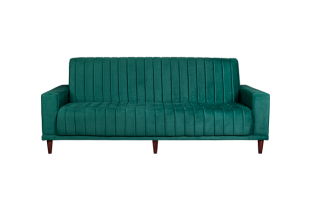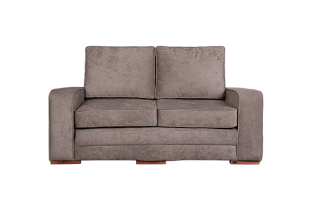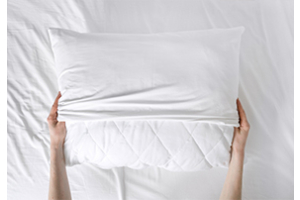Can Sleeping on The Couch Cause Nerve Damage


Can Sleeping on the Couch Cause Nerve Damage
You probably slept on the couch hundreds of times in your twenties without even thinking about it, and you might regularly still do it after a long day of work whilst watching your favourite show. However, new science is indicating that one of the most common causes of nerve damage to the neck and back could be related to sleeping on the couch far too often
In this blog, Sleep For Life will help you understand why you shouldn’t sleep on the couch and give you tips to avoid long-term nerve damage by teaching you how to sleep in a healthy position. If you’re wondering can sleeping on the couch cause nerve damage, this blog will answer your question and more.
The Side Effects of Sleeping on a Couch
If you’ve ever nodded off to sleep while watching a movie and woken up in the early hours of the morning with a stiff neck and aching limbs, you’ll be the first to know that there definitely are negative side effects to sleeping on the couch.
In general, when you fall asleep on the couch, you are not in the most ergonomic position and your head is generally not well supported on a suitable pillow. You are generally cramped and in a squashed-up posture and your neck has either fallen too far backwards, sideways or hanging down. These positions all contribute to long-term damage to your spine and neck and can result in;
- Stiffness in the neck and limbs
- Pins and needles in the arms and legs
- Blurred vision
- Lower back pain
- Pinched nerves in the neck or lower sacral area
If you persistently sleep on the couch and experience these negative side effects, you could be setting yourself up for long-term damage. Are you still wondering if it is bad to sleep on the couch?
Of course, we should add this disclaimer! There are times when sleeping on the couch is a necessity, like when the family is visiting from out of town and you need to relinquish your bed. Or when you’ve enjoyed too much festive champagne and know that it’s safer to sleep over on the couch than drive home. In these instances, it's perfectly fine to couch sleep, but the idea is not to make a habit out of it, to prevent long-term damage to your neck, back, and nervous system.
The Downsides to Sleeping on The Couch
Apart from the list of side-effects experienced often after (and during) sleeping on the couch, there are several other downsides which can contribute to long-term effects to your health;
#1 – Couches Are Hot
Couches, unlike beds, are not designed to keep you cool and control your body temperature. Good quality beds are made using materials that are cooling to the body and can keep your body at a cool temperature throughout the night, ensuring restful sleep. Couches are not made of the same materials and will, therefore, not keep you cool
#2 – Couches Are Not Ergonomic
Couches are designed to be sat on during times of socialising or chilling at home, they are not designed ergonomically enough to be slept on for 8 – 10 hours a night. They are not designed with any kind of body and back support or pressure point support and relief like good quality beds are.
#3 – Couches Are High-Germ Areas
If you think about the number of people that put their bums, feet, and dirty hands on your couch, you'll realise that couches are not the most hygienic of places. They are hard-wearing surfaces which are designed to be sat on, not offering you a clean, smooth, germ-free surface on which to sleep. If you took a swab test of your couch versus your bed, you would see that couches are often dirtier than beds are.
#4 – Couches Offer No Spinal Alignment
As we’ve mentioned, couches are meant for sitting for shortish periods of time. They do not offer specific areas of support to the necessary parts of your spine that a good quality bed does. Therefore, when you sleep on a couch, you may not be getting the right kind of support to your lower, middle, and upper spine that you should be.
Best Sleeping Position To Prevent Nerve Damage
Experts have analysed sleep for years from the way people sleep to what they do and think about in their sleep. Sleeping positions are one area of analysis that has been greatly studied and it has been found that people mainly sleep in one of three positions; on their stomachs, on their sides, or on their backs. You often move between two or more positions at night, but the position you fall asleep in is said to be your predominant sleeping position.
In terms of preventing nerve damage to your spine and neck, experts have confirmed that sleeping on your back is the best. This promotes a neutral spine all the way from your lower lumbar region up to your neck. To promote the healthiest, best sleep position, here’s how to organise yourself before you fall asleep;
- Lie flat on your back with a supportive yet soft pillow under your head
- Place one pillow under your knees to allow them to remain slightly bent and not completely straight.
- Rest your arms at your sides with your palms facing up.
At Dial•a•Bed, we offer a range of beds for every need. Whether you're in need of a single bed to add to your guest room so that when the necessity hits, you won't have to sleep on the couch, or a king size bed for your master bedroom that will promote a good night's sleep, we've got your covered.
Check out our wide range of beds in a variety of sizes now including:
For a range of the most comfortable mattresses, each designed with the latest in sleep technology, and engineered to suit your unique sleep style, shop online now with Dial•a•Bed.
Visit a Dial•a•Bed store near you today. Find your nearest store.







